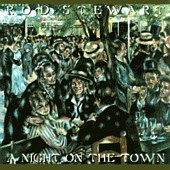|
Rod cut seven albums with the group, all of which were overshadowed by what he was able to do by himself. His fourth solo album, Never A Dull Moment, produced two Top 40 hits in 1972: "You Wear It Well" and "Angel" (the latter released as a single without Rod's consent). Sing It Again, Rod, a 1973 "best of" collection, was a good seller, as was Smiler, (1974), his last album of new material for Mercury.
In May of 1975, Stewart signed with Warner Brothers, and not long afterward, he took up residence in Los Angeles. His debut solo effort for the label, Atlantic Crossing, was released in the summer of '75. Veteran producer Tom Dowd supervised the recording sessions at Muscle Shoals and Los Angeles; joining Stewart were the Muscle Shoals and Memphis Rhythm Sections, as well as other top studio musicians. The album went gold in America without the help of a hit single (although in other countries, "Sailing" did become a million-selling 45). Then, in December, Rod made official what everyone had expected for months: He was leaving the Faces and from then on would be working "alone." A Night On the Town was Rod's first album without a single member of his old band on it. This fact was underlined on the album jacket by the cryptic words "All selections written or selected by R.S." Again, Tom Dowd handled production, with sessions held in California at Cherokee Studios and in Alabama at Muscle Shoals.
Rod wrote four of the nine tunes on the album, including the one that kicks off the "slow side." "Tonight's the Night" is a song of seduction, filled with barely restrained, gleeful anticipation. "It's as erotic as 'Je T'aime,'" wrote one critic. "The string background and tenor sax solo are as romantic as dinner by candlelight." The track ends with breathy female moans, a sexy voice purring in French. That unbilled cameo was provided by Rod's girlfriend at the time, Swedish actress Britt Ekland. "Tonight's the Night" was released as a single in the fall of 1976, and immediately ran into controversy. Many programmers objected to phrases in the song, which described a girl losing her virginity. Some tried to tape the tune and hack out offensive lines like "Angel, spread your wings and let me come inside." Others just banned the record completely. Even in Europe, it received spotty air play. However, enough stations did play it to create a demand, and after a few weeks, most radio people were forced -- by listener request -- to air the song. In October, it entered the national pop charts, and by November it was the number-one single in the country. It stayed there for seven weeks -- longer than any other record in 1976.
No comments so far, be the first to comment. |


